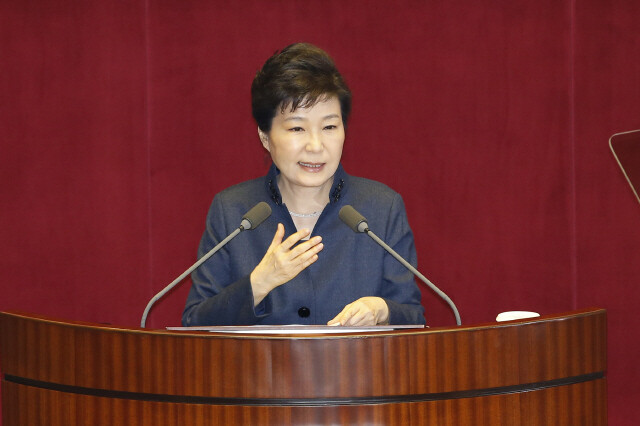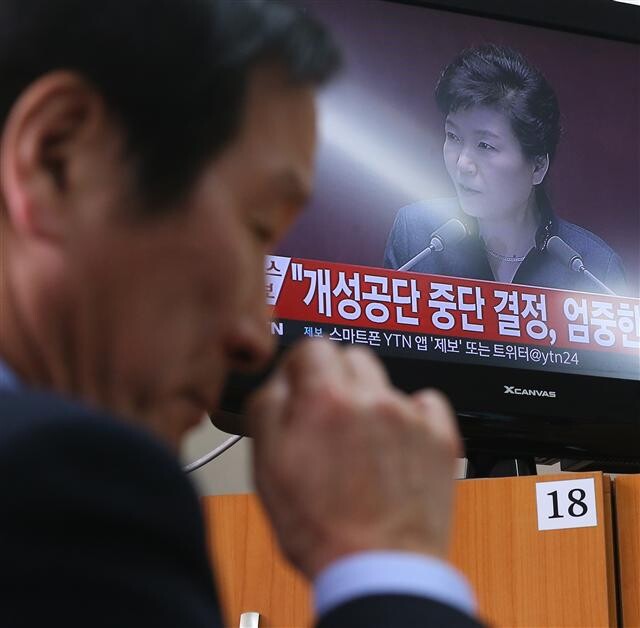hankyoreh
Links to other country sites 다른 나라 사이트 링크
[Analysis] Are Park’s remarks a transformation of her N. Korea policy?

The approach, goals and methods of South Korean President Park Geun-hye’s response to North Korea’s nuclear weapon test and rocket launch that she outlined in her address to the National Assembly on Feb. 16 are simple. She promised to work with the international community to maintain and intensify pressure and sanctions in order to create “an environment in which the North Korean regime will realize that nuclear development will only bring about collapse and will have no choice but to change on its own.” The corollary of this logic, though, is that, if North Korea refuses to give up its nuclear weapons, South Korea will keep pushing it until the regime collapses.
“If we go down this road, there may be bigger challenges waiting for us, but I’m confident that, if the public supports us and is with us, we can achieve this,” Park said. The implication is that Park has resigned herself to a protracted struggle.
During her address, Park did not once mention the possibility of resolving the North Korean nuclear issue through dialogue and negotiations, such as the Six-Party Talks, which implies that she is not even considering this option.
Park also omitted any mention of humanitarian aid or exchange and cooperation with the North. Instead, she pointed out that the South Korean public and private sectors had given US$3 billion in aid to North Korea since the administration of former president Roh Tae-woo (1988-1993) before declaring that South Korea must stop handouts to the North. Park apparently views humanitarian aid and cooperation and exchange as handouts.
Backed by these assumptions, Park said, “We will never be able to break the North Korean regime’s will to develop nuclear weapons using current methods and goodwill. In order to prevent the North from upgrading its nuclear weapon and missile capacity, we must block the influx of foreign currency into North Korea.” In other words, Park means to cut off the flow of money to Pyongyang and put more pressure and sanctions on it.
This helps explains Park’s remark that “the complete suspension of operations at the Kaesong Complex was just the beginning of a series of measures that we will take in concert with the international community.”

The question, however, is whether there are any other means by which Park can achieve the goals she outlined. While hope does not make for good policy, rage is no better. Policies are predicated on actionable methods and a process for executing them.
While Park said that the complete suspension of operations at the Kaesong Complex was “just the beginning,” Seoul does not have any more ways to put pressure or sanctions on North Korea on its own. The May 24 Measures taken by the administration of President Lee Myung-bak banned all forms of cooperation and exchange except for the Kaesong Complex, and the government of Park Geun-hye has closed the doors of the Kaesong Complex, which was the last safety value remaining in inter-Korean relations.
The military communication lines have been cut, and the liaison office at Panmunjeom have been closed as well. Today, there is not a single thread connecting North and South Korea.
“How is Park supposed to achieve her goals when she doesn‘t have any means of doing so? If dialogue and negotiations are excluded, there is no way to solve this problem,” said Kim Yeon-cheol, a professor at Inje University.
In addition, there are inevitable limitations on the measures that the international community can take against North Korea. The new sanctions resolution against the North that the UN Security Council is currently deliberating will no doubt be tougher than Resolution No. 2094, which followed the North’s third nuclear test, but there is no chance that it will be the “terminating resolution” for which Park is hoping.
The Chinese government still insists that it wants to protect peace and stability on the Korean Peninsula while also bringing about the denuclearization of the peninsula. This means that it will only agree to “reasonable sanctions” that will not disturb the status quo.
It is also reasonable to think that, with Park pushing for the deployment of the THAAD (Terminal High Altitude Area Defense) anti-ballistic missile system - to which the Chinese government has repeatedly and openly expressed its opposition - it will be even harder to secure China’s cooperation on this issue.
Given that more than 90% of North Korea’s foreign trade is with China, international sanctions against North Korea are unlikely to be effective without the full participation of China, as even Park admits. The Russian government has also repeated its opposition to deploying THAAD, along with the need for stability on the Korean Peninsula.
It is very suggestive that the only countries that have expressed their explicit support for the Park administration‘s complete suspension of operations at the Kaesong Complex are the US and Japan.
There are a number of views about whether Park’s address on Tuesday represents a complete transformation of her approach to North Korean policy.
An official from the Unification Ministry downplayed the change, insisting that this was not a complete rejection of “trustpolitik,” Park’s signature policy for the Korean peninsula.
“Trustpolitik, which emphasized a gradual approach, had already been basically replaced by the ’unification as jackpot‘ idea in 2014. Park’s address makes explicit that her approach to unification presumes the collapse of the North Korean regime and its absorption by South Korea,” said Jeong Se-hyun, permanent representative of the Korea Peace Forum and a former Unification Minister.
By Lee Je-hun, staff reporter
Please direct questions or comments to [english@hani.co.kr]

Editorial・opinion
![[Column] Season 2 of special prosecutor probe may be coming to Korea soon [Column] Season 2 of special prosecutor probe may be coming to Korea soon](https://flexible.img.hani.co.kr/flexible/normal/500/300/imgdb/original/2024/0426/3317141030699447.jpg) [Column] Season 2 of special prosecutor probe may be coming to Korea soon
[Column] Season 2 of special prosecutor probe may be coming to Korea soon![[Column] Park Geun-hye déjà vu in Yoon Suk-yeol [Column] Park Geun-hye déjà vu in Yoon Suk-yeol](https://flexible.img.hani.co.kr/flexible/normal/500/300/imgdb/original/2024/0424/651713945113788.jpg) [Column] Park Geun-hye déjà vu in Yoon Suk-yeol
[Column] Park Geun-hye déjà vu in Yoon Suk-yeol- [Editorial] New weight of N. Korea’s nuclear threats makes dialogue all the more urgent
- [Guest essay] The real reason Korea’s new right wants to dub Rhee a founding father
- [Column] ‘Choson’: Is it time we start referring to N. Korea in its own terms?
- [Editorial] Japan’s rewriting of history with Korea has gone too far
- [Column] The president’s questionable capacity for dialogue
- [Column] Are chaebol firms just pizza pies for families to divvy up as they please?
- [Column] Has Korea, too, crossed the Rubicon on China?
- [Correspondent’s column] In Japan’s alliance with US, echoes of its past alliances with UK
Most viewed articles
- 1[Column] Season 2 of special prosecutor probe may be coming to Korea soon
- 2‘We must say no’: Seoul defense chief on Korean, USFK involvement in hypothetical Taiwan crisis
- 3Division commander ordered troops to enter raging flood waters before Marine died, survivor says
- 4Is N. Korea threatening to test nukes in response to possible new US-led sanctions body?
- 5Is Japan about to snatch control of Line messenger from Korea’s Naver?
- 6No good, very bad game for Korea puts it out of Olympics for first time since 1988
- 7[Editorial] Korea’s surprise Q1 growth requires objective assessment, not blind fanfare
- 8Korea’s 1.3% growth in Q1 signals ‘textbook’ return to growth, says government
- 9N. Korean delegation’s trip to Iran shows how Pyongyang is leveraging ties with Moscow
- 10Amnesty notes ‘erosion’ of freedom of expression in Korea in annual human rights report